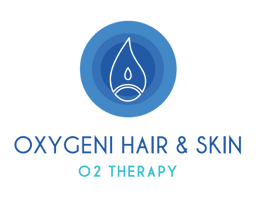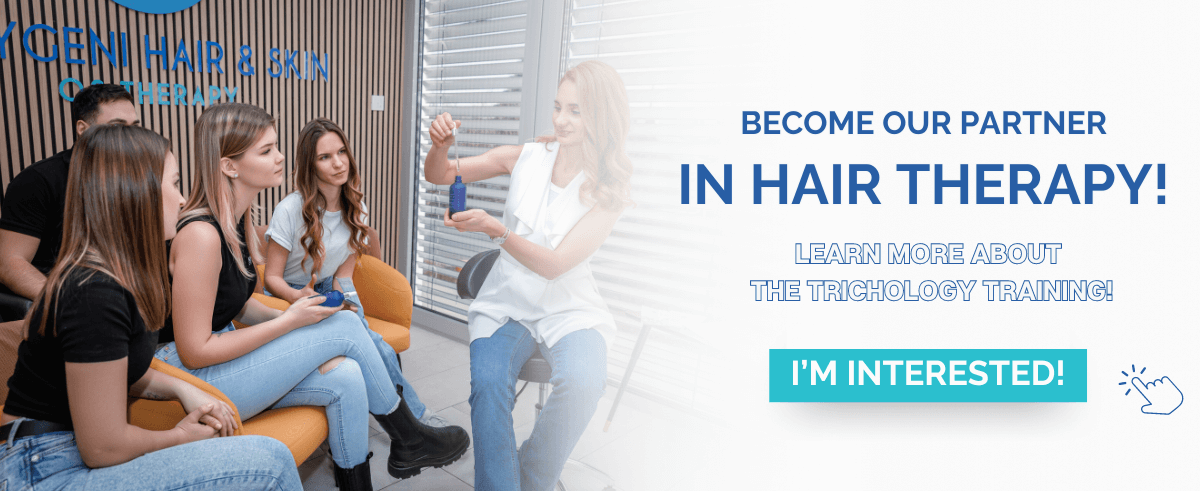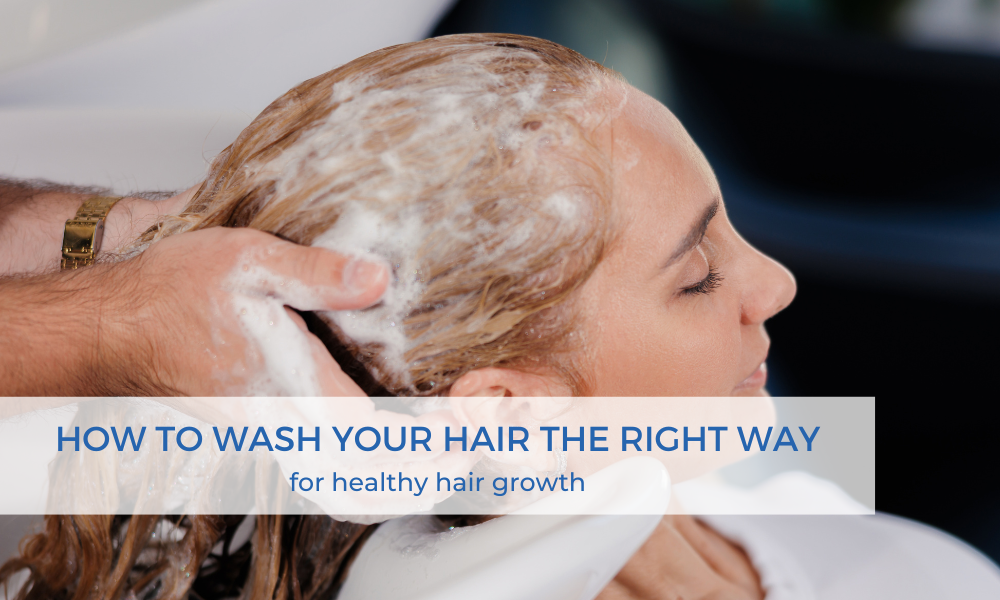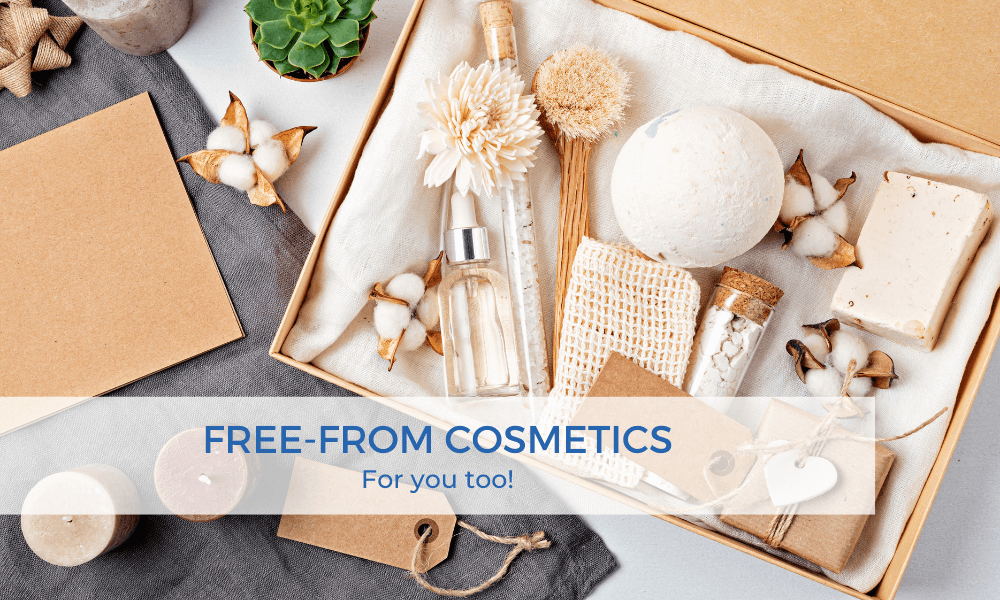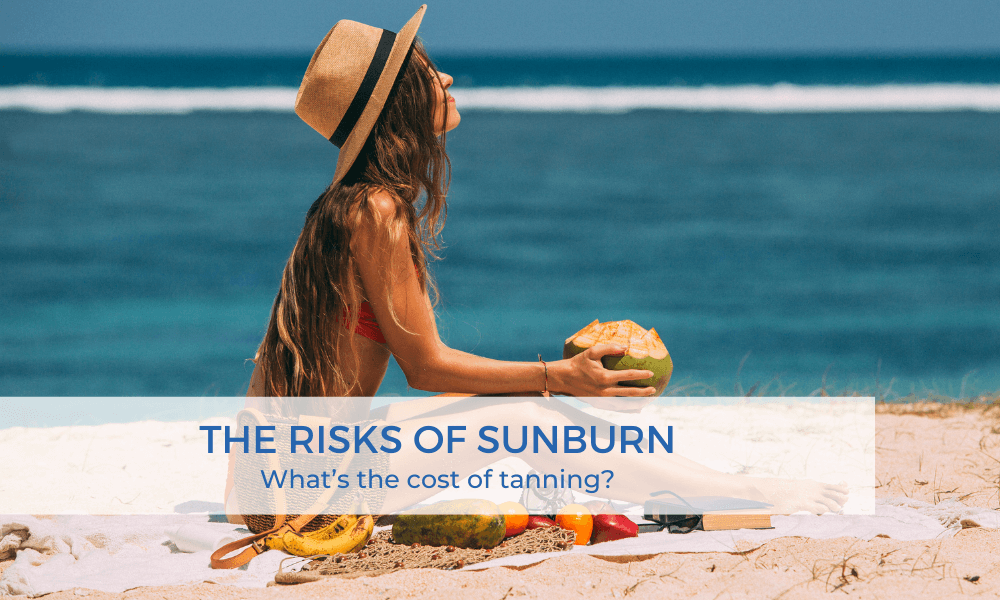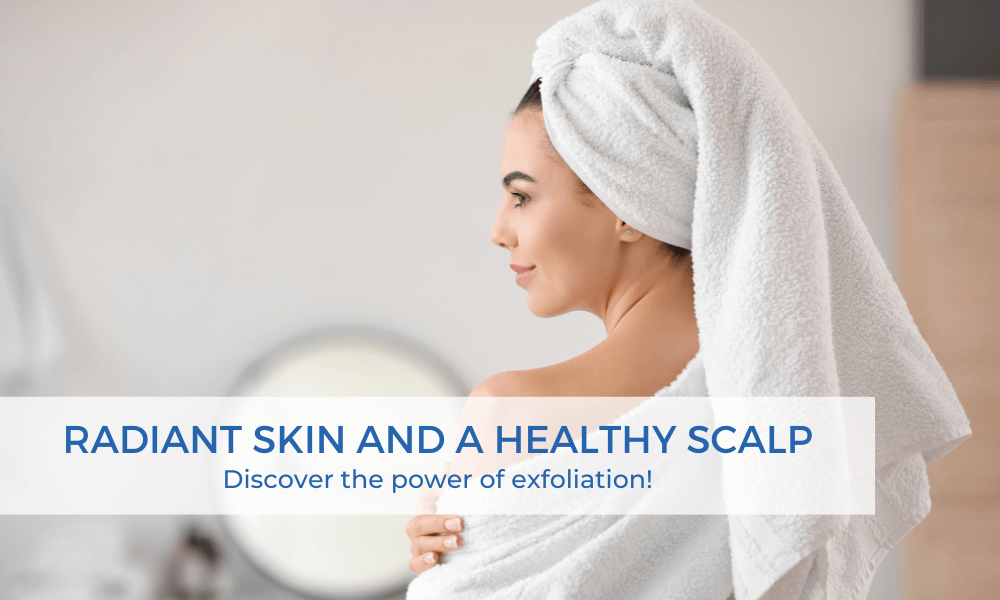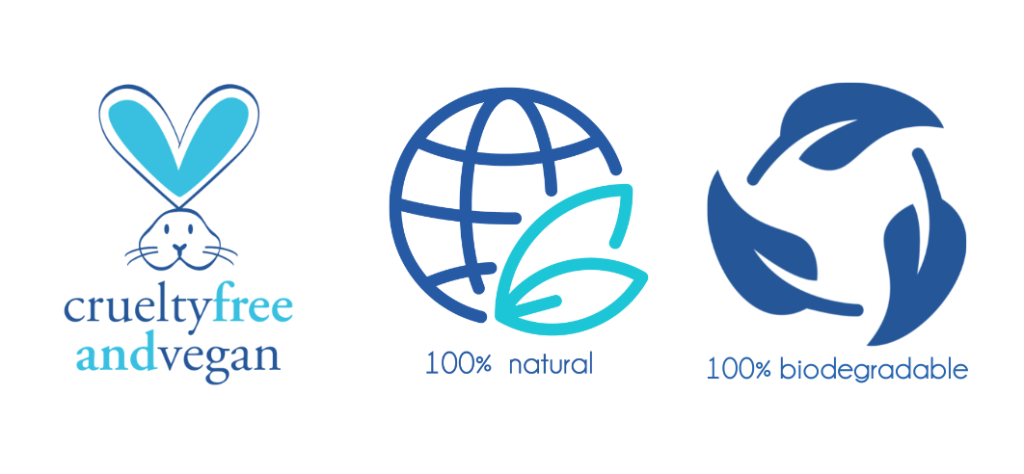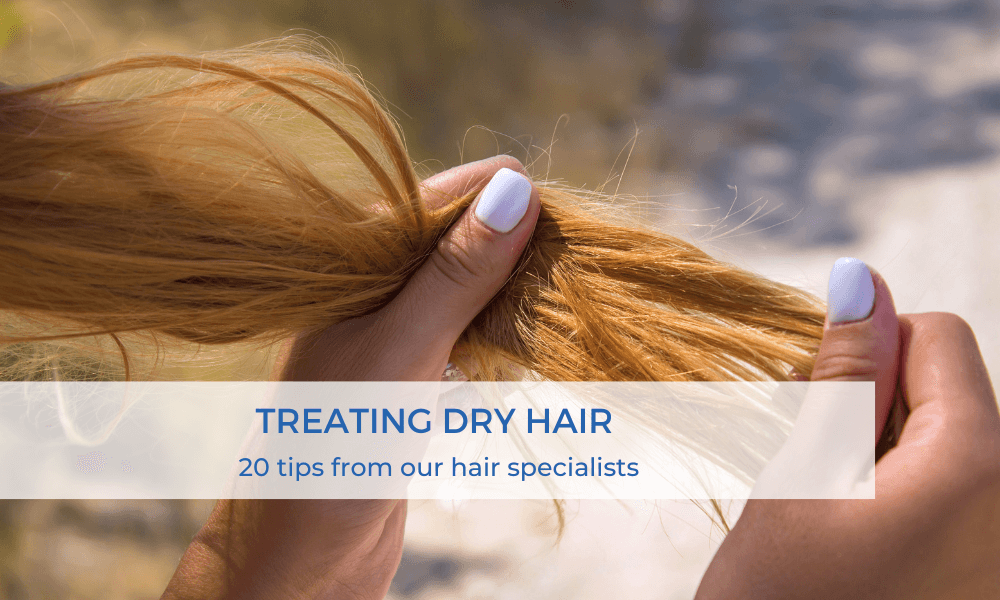
TREATING DRY HAIR – 20 TIPS FROM OUR HAIR SPECIALIST
Treating dry hair is a common concern for both women and men, as many factors can cause it, from environmental influences to chemical treatments and inadequate hair care practices. Additionally, scalp dryness can lead to other symptoms requiring more serious treatment, such as psoriasis, hair loss, or severely irritated, red scalp. In this article, we will explore what causes dry scalp, identify its triggers, and share tips from our hair experts for effective treatment.
WHY IS MY SCALP DRY?
A dry scalp can happen when the glands near the hair follicles don’t produce enough sebum. Normally, sebum protects the hair, giving it a shiny and glossy appearance. If the scalp produces too little oil, the hair lacks a natural protective oily layer to shield it from environmental damage.
Strong shampoos, frequent shampooing, sun exposure, wind, low humidity, and chlorine can all strip moisture from hair strands and remove sebum. Without the oily film, less moisture is retained, leaving hair naturally dry, brittle, and coarse. This often becomes more apparent after drying, when hair loses its moisture, color, and shine.
Reduced sebum secretion results in dry hair that appears dull, hard to the touch, rough, lacking shine, and difficult to style. The hairstyle doesn’t hold, and the hair ends appear lighter. The hair becomes difficult to comb, cracks while brushing, and the hair ends split. Frequent and harsh chemical treatments (e.g., perming) increase the risk of developing dry hair.
WHAT ELSE INCREASES THE RISK OF DRY HAIR?
The causes of dry hair and scalp can be both external and internal. Externally, improper hair dyeing, unsuitable hair care products, harsh chemical treatments, perming, mechanical damage, misuse of hair products such as strong shampoos, styling products and hairsprays, the hot air of hairdryers, frequent washing removing sebum and removing moisture out of the hair – all damage and dry out the hair. This leads to breakage, exposing inner hair parts to adverse effects: hair dries out, breaks, and splits.
Internally, poor dietary habits and insufficient intake of essential fatty acids and vitamins that maintain skin moisture and optimal oiliness can cause dry scalp. The problem’s source should always be examined in a broader context, not just the affected area.
Let’s explore other causes of dry scalp and hair beyond sebum underproduction:
ENVIRONMENTAL FACTORS
External factors we encounter daily can also cause scalp dryness. Key factors include strong sunlight, high temperatures (especially in summer and saunas), environmental chemicals, poor air quality, and urban pollution with high carbon dioxide levels. Additionally, frequent exposure to air-conditioned environments can lead to dry scalp.
CHEMICAL TREATMENTS
Rough, harsh treatment often result in dry, irritated scalp and damaged, broken hair. Common treatments such as perming, permanent straightening, bleaching, and dyeing significantly degrade hair quality and irritate and dry the scalp. Mild but similar damage occurs with regular hair styling, straightening, curling, and blow-drying at high temperatures, as these primarily damage hair structure even without chemicals. Moreover, DIY at-home hair dyeing can also cause significant damage.
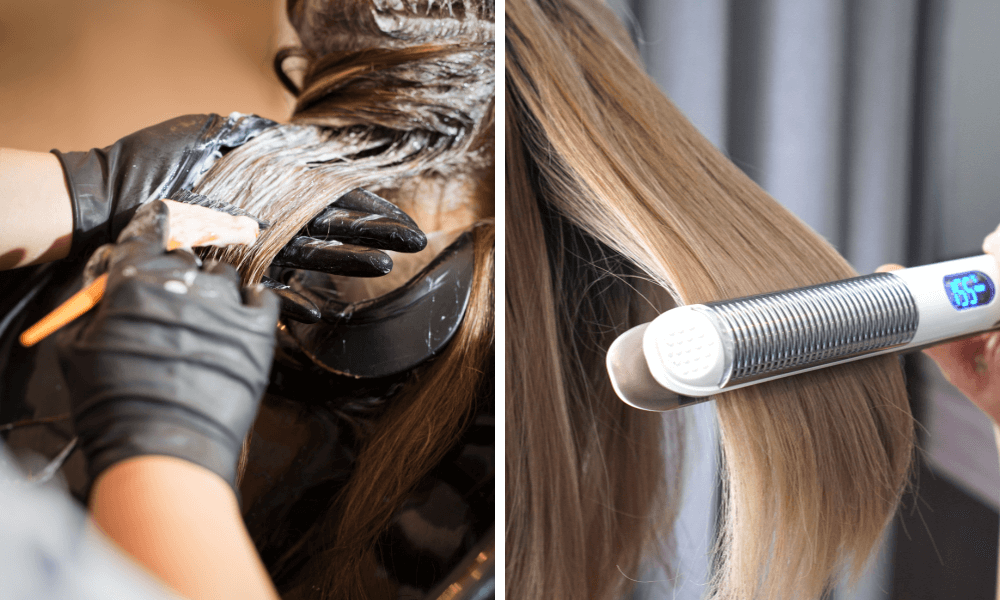
CHEMICALS IN HAIR CARE PRODUCTS
Many shampoos contain sulfates, known as SLS and SLES, which act as cleansing agents. SLS is a strong, harsh agent that strips the hair of essential oils, breaks down proteins, and hinders healthy hair growth. Sodium Laureth Sulfate (SLES), also a sulfate, is a bit gentler but is still not recommended for sensitive scalps.
Another common ingredient is silicone, an artificial lipid made of oxygen and silicon. Silicone forms an invisible layer on the surface of the hair, making it smooth and shiny. However, this silicone layer prevents essential nutrients and moisture from penetrating the hair, leading to the hair weighing down and weakening over time.
"DRY" DIET
If we don’t give our bodies enough good-quality nutrients, it can lead to excessive scalp dryness and hair breakage. Essential fatty acids like Omega-3, proteins, and minerals such as zinc, copper, and calcium are vital for the scalp and hair. But more on this later!
STRESS, WEAKENED IMMUNE SYSTEM
Hair is one of the best indicators of our overall health, as it can become dull and brittle and even fall out under the influence of various conditions (e.g., anemia) and stress.
WHO IS MOST PRONE TO DRY SCALP AND DAMAGED HAIR?
Work conditions, frequent hairstyles, or the level of stress placed on hair can impact the health of the scalp and hair. Here are a few scenarios that are more likely to result in dry scalp and damaged hair:
- Frequent hair coloring, highlighting, bleaching, regular root touch-ups:
These procedures not only damage the hair structure but also dry and irritate the scalp.
- Perming, permanent hair straightening:
These take a toll on the hair, with high-temperature treatments damaging the hair structure.
- Aging:
As we age, particularly when greying, hair quality can completely change, becoming rough, dry, and unmanageable – clear signs of vitamin deficiency.
- Improper hair care routine:
Using shampoos and treatments loaded with chemicals, drying hair at high temperatures, or not drying hair at all.
- Frequent hair washing:
Particularly common among those with fine, flat hair, who might wash their hair daily, further drying and irritating the scalp. This is also common among athletes.
- Excessive sun exposure:
Those who work in the sun frequently or beachgoers and sunbathers are at risk of hair damage and over-dry, sunburnt scalp.
- Daily styling:
Not only do alcohol-based finishing products (hairspray, hair lacquer) dry and irritate the hair and scalp, but quick fixes like dry shampoo “washing,” root lifting powders, or frequent styling with curling irons or straighteners also contribute to the developement of a dry scalp.
- Air-conditioned offices:
While more people are working from home, many still work in offices, factories, or workshops. Air conditioning and overly intense, cool air can harm the scalp, as can dark rooms that receive little to no natural light.
- Not drying hair:
Dry hair, prone to split ends, should not be left to air dry; a hair dryer should be used. The heat from a hair dryer closes the hair cuticles, making the hair less reactive to humidity. Air drying leaves the cuticles open, making hair more responsive to environmental humidity changes.
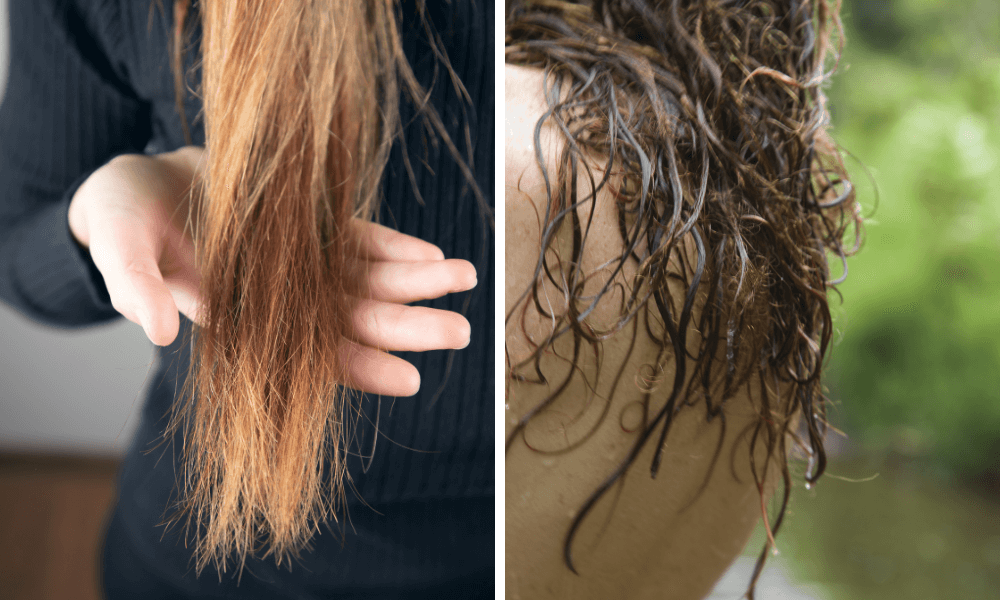
CONSEQUENCES OF DRY HAIR
If not enough attention is paid to dry, mildly irritated scalp, the problem can unfortunately worsen. According to the latest research, genetic predisposition plays a significant role in its development, but stress, hormonal changes, or infections can also trigger the condition. Bacterial or viral infections, various medications, liver problems, or protein digestion disorders can exacerbate the issue. In advanced stages, it can lead to chronic hair loss, or even symptoms of psoriasis and dandruff.
DAMAGED HAIR AND HAIR LOSS
The skin inflammation caused by chemicals used in modern hairdressing (perm solutions, dyes), as well as physical injuries caused by tools (sharp-toothed metal combs, too-dense combs, hairdryers), can lead to hair loss and allergic reactions on the scalp. Hair strands subjected to constant stress wear out and become exhausted. Vigorous brushing, pulling, and exposure to hot air cause the cortex of hair strands to thicken and crack in knots. Hair strands break at the affected areas. This process is often irreversible, and the hair needs to be cut.
DRY SCALP AND DANDRUFF
This type of dandruff is particularly unpleasant because the flakes do not adhere to the sebum and fall onto clothing, creating an unkempt appearance. The dry, dehydrated scalp looks dull and often itches intensely and feels tight. Due to the dry condition of the scalp, the hair also becomes stiff and brittle. Learn more about the treatment and causes of dry, itchy scalp in our blog!
PSORIASIS
This extremely common condition affects both sexes and can occur at any age—from childhood to old age—but the first symptoms are most often observed during puberty. The proliferation process of skin cells accelerates to 5-10 times the normal rate, resulting in imperfect keratinization. The rapid production of skin cells leads to the accumulation of inflamed, irritated, sore, shiny, red patches on the skin, which, after drying, are covered with a scaly, whitish layer.
These scaling patches, which can occur anywhere on the body and cause intense itching, most commonly appear on the scalp, knees, back, elbows, and chest. In addition to genetics, stress, hormonal changes, or infections can also trigger the disorder. Bacterial or viral infections, various medications, liver problems, or protein digestion disorders can exacerbate the problem. Read more about the development and treatment of psoriasis by clicking here!
TIPS FOR TREATING DRY HAIR
1. SUPPLEMENTATION WITH OMEGA-3 AND OMEGA-6
The treatment of dry hair begins with the supplementation of essential fatty acids. Omega-3 and Omega-6 polyunsaturated fatty acids are known for their high antioxidant content and moisturizing effect. They replenish the oil reserves in the hair, among many other positive effects.
Natural sources: Marine fish, flaxseed, chia seeds, walnuts, canola oil
2. COPPER INTAKE
One of its most important functions is participating in collagen production and the synthesis of melanin pigment (the pigment of hair and skin) which protects against ultraviolet (UV) radiation. Additionally, it plays a role in red blood cell production and iron storage. Copper deficiency is rare but most commonly occurs when it cannot be absorbed due to some illness. Symptoms of deficiency include fatigue, dry, brittle hair, anemia, etc. Therefore, copper plays an important role in the treatment of dry hair.
Natural sources: Seafood, rye, wheat, nuts, avocado, mushrooms, tomatoes, bananas
3. ZINC SUPPLEMENTATION
Besides maintaining healthy skin and hair, zinc is involved in the functioning of the immune system, hormone balance, wound healing, and is effective in treating certain skin conditions. Daily requirement fro adults: about 10-12 milligrams. Severe deficiency is fortunately rare, but mild deficiency can lead to hair loss, delayed wound healing, increased susceptibility to infectious diseases, and dry, cracked, peeling skin.
Natural sources: Meat, eggs, cheese, seafood, peanuts, almonds
4. SUFFICIENT PROTEINS
Amino acid deficiency can most commonly result from improper nutrition, but numerous other factors (increased protein use, infectious diseases, stress, old age, etc.) can also be behind it. One of the most important amino acids for our hair is the sulfur-containing cysteine, found in the largest amounts in eggs, meat, and dairy products. Replenishing essential amino acids is also crucial for treating dry hair.
Natural source: The richest source of protein is soybeans.
5. VITAMIN A - SUPPLEMENTATION
Vitamin A is indispensable for the healthy development of the eyes, hair, nails, and bones. Without enough vitamin A, the hair becomes brittle, the skin cracks, and dental problems can also arise. Ensuring adequate vitamin A intake is essential for treating dry hair.
Natural sources: Fish, egg yolk, liver, milk
6. VITAMIN C - SUPPLEMENTATION
One of the most important effects of vitamin C is that it strengthens the walls of capillaries, is a component of connective tissue fibers (collagen fibers) in the second layer of the skin (the dermis), and helps iron absorption. It combats hair breakage and protects the hair structure from further damage.
Natural sources: Citrus fruits, broccoli, peppers, kiwi
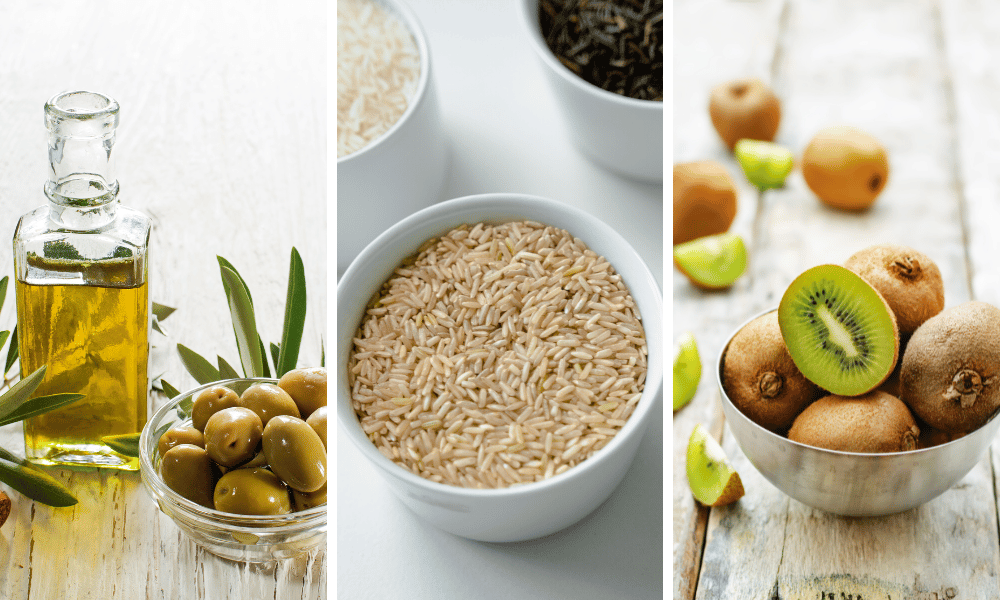
7. VITAMIN E - SUPPLEMENTATION
Vitamin E is a fat-soluble vitamin with antioxidant properties that plays an important role in the development and maintenance of healthy hair and nails. Its most significant effect is its ability to neutralize cell-damaging free radicals, thereby protecting against certain diseases (such as cancer and heart disease), strengthening the immune system, and delaying the aging process. It enhances collagen production, contributing to hair growth and the health of hair strands.
Natural sources: Nuts, olive oil, wheat germ oil
8. SELENIUM
Selenium is an antioxidant mineral necessary for maintaining healthy hair and nails. Daily requirement: approximately 60-70 micrograms. Its many beneficial effects are primarily due to its antioxidant properties and its role as an essential component of enzymes (proteins involved in specific chemical processes). Its most important effects include strengthening the immune system. Deficiency can lead to hair loss, brittle hair, and an increased risk of immune system diseases.
Natural sources: Seafood, meats, brown rice
9. IRON SUPPLEMENTATION
Iron strengthens hair and prevents breakage. It is one of the most important minerals for the body, essential for the formation of hemoglobin, the blood’s oxygen-carrying protein, as well as being crucial for the function of several enzymes and the immune system.
Natural sources: Liver, beef, legumes, spinach, sorrel, lettuce, dried fruits, beer (yeast).
10. FLAXSEED
Flaxseed is an excellent antioxidant that, when consumed internally, promotes digestion, relieves the liver, thus supporting detoxification processes. Thanks to proper digestion, the condition of the skin and hair follicles also improves. Rich in Omega-3 fatty acids, which strengthen weakened hair follicles. The vitamin E it contains nourishes the hair from the follicle to the ends, thus restoring vitality to dull, lifeless, weakened, and dry hair.
Consume flaxseed bread or add a handful of flaxseeds to your morning yogurt or muesli.
11. CHAMOMILE
When treating dry hair, it is essential to soothe the scalp, for which chamomile is a perfect choice, a well-known herb with calming effects. In addition, it is known for its antioxidant, cleansing, and moisturizing effects. It soothes irritated skin, heals sunburned scalp, protects the skin from damage caused by free radicals, which are the causes of premature aging. It refreshes and rejuvenates the scalp.
Consume it internally as tea or rinse your hair and scalp with lukewarm chamomile infused water.
12. HEMP SEED
Hemp is typically utilized for its fiber, seeds, or oil. This type of seed is rich in complete proteins, and the oil extracted from it contains more fatty acids than any other seed found on Earth. Hemp leaves are also edible, containing a high amount of fiber and calcium. Calcium aids in bone formation and beautifies hair, skin, and nails.
Consume hemp seed butter, cold-pressed hemp seed oil, hemp seed bread, or even hemp seed beer.
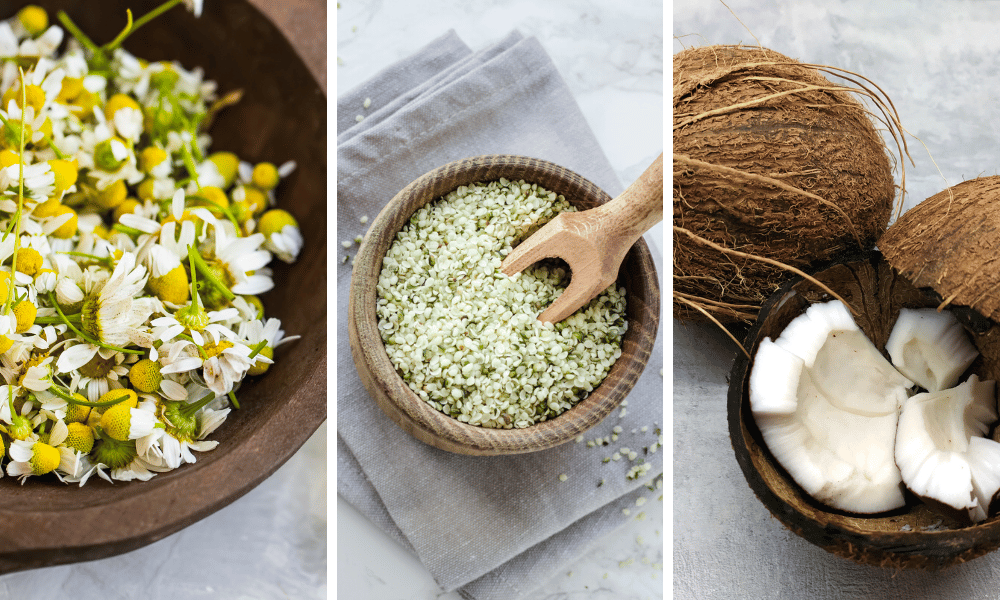
13. POPPY SEED
Poppy seed oil has similar properties to hemp and flaxseed oils, making it one of the most important superfoods for treating dry hair. It is rich in essential fatty acids, which nourish, hydrate, and soothe the skin. Its high calcium and magnesium content regenerates, protects, and makes the skin and hair more elastic.
Instead of poppy seed cake or pastries, which may not be the best choice despite being delicious, mix poppy seeds into your morning kefir or yogurt.
14. COCONUT
Coconut improves digestion and is an excellent immune booster, stimulating thyroid function. It regulates the hormonal balance, containing precursors called pregnenolones, which are hormone-like compounds that prevent aging. Applied locally, it relieves skin rashes and can even prevent them, regenerating and softening the skin.
15. SOOTHING WITH ALOE VERA
Aloe vera’s beneficial properties are also evident in hair hydration; its alkaline properties help maintain the pH balance of the scalp and hair, thus helping the hair retain the moisture it needs. Aloe vera also stimulates blood circulation in the hair follicles, which promotes hair growth.
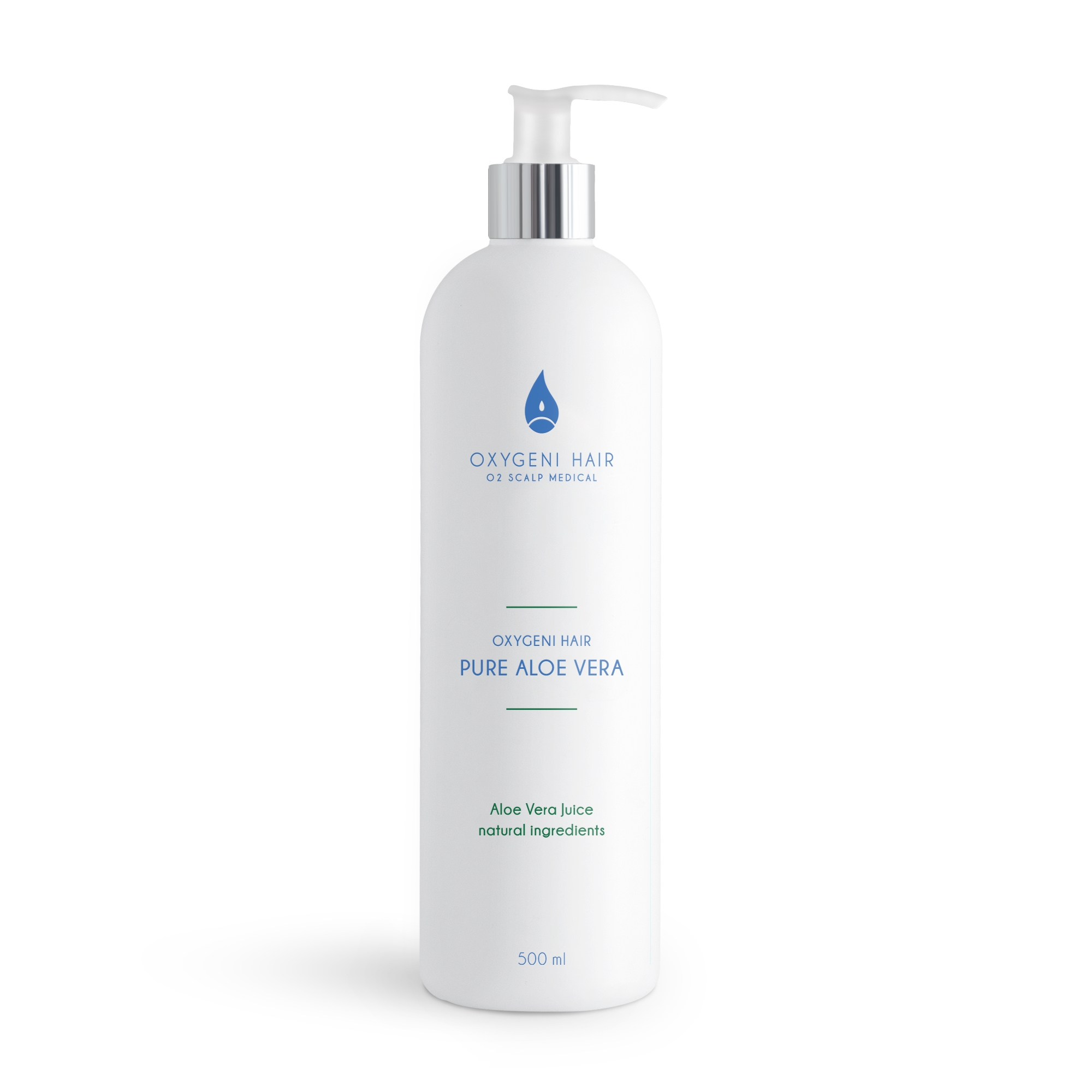
Pure Aloe Vera
Oxygeni Hair Pure Aloe Vera is produced by warm pressing aloe vera. It acts as an effective carrier. It is absorbed quickly and deeply. It is excellent for problematic skin, soothing and hydrating sensitive skin, and reducing irritation.
16. REPLENISHING WITH JOJOBA OIL
Jojoba oil normalizes collagen production and revitalizes stressed hair and scalp. As a hair end treatment, it fully regenerates and hydrates damaged areas. It is recommended to apply it to the scalp and hair strands using a carrier for proper absorption.
Apply it to your scalp and hair together with the Pure Aloe Vera carrier!
17. GENTLE SHAMPOO CLEANSING
Gently cleanse dry, irritated scalp with a mild shampoo and avoid rubbing. Avoid intensive herbal shampoos and opt for a shampoo with a high aloe vera content!
18. ALLOW LEAVE-ON TIME FOR ACTIVE INGREDIENTS!
Choose a hair mask suitable for your hair type – we recommend using chemical-free, 100% natural hair masks as they do not irritate the scalp. Thoroughly apply the mask to your hair and ensure you allow the 5-minute activation time. To enhance effectiveness, wear a shower cap during this period.
19. ALWAYS DRY YOUR HAIR
Gently pat your hair dry with a towel, pressing the towel to your hair to make it towel-dry, then dry your hair on a lukewarm setting after every wash. This also helps protect your hair strands from damage.
20. OXYGEN THERAPY
The oxygen therapy treatment developed by Oxygeni Hair and Skin helps ensure that the cells and hair follicles receive adequate oxygen supply. The therapy is preceded by a micro-camera scalp examination, where inflammations and problems in the deeper layers of the skin are visible.
The treatment is 100% reliable and risk-free, using 100% natural active ingredients. Adequate oxygen, vitamin, and mineral supply to the hair follicles revitalizes, strengthens, and thickens the hair strands, and the scalp is cleansed of impurities, regaining its proper pH level.
Oxygeni Hair oxygen therapy is based on strengthening the immune system, making it applicable for any scalp and hair health issues, guaranteeing visible results.
+1 TIP TREATING DRY HAIR WITH PROPER HAIR CARE
Your at-home hair and skincare routine is crucial for treating dry hair. For lasting recovery, using chemical-free and 100% natural products provides a long-term solution.
Dry hair can be caused by hair care products that contain strong chemicals. It’s important to focus on prevention by practicing proper hygiene. Keep your scalp clean with appropriate natural active ingredient products. Check out Oxygeni Hair products by clicking here, which contain carefully selected active ingredients, protecting the scalp and hair from artificial, harmful substances.
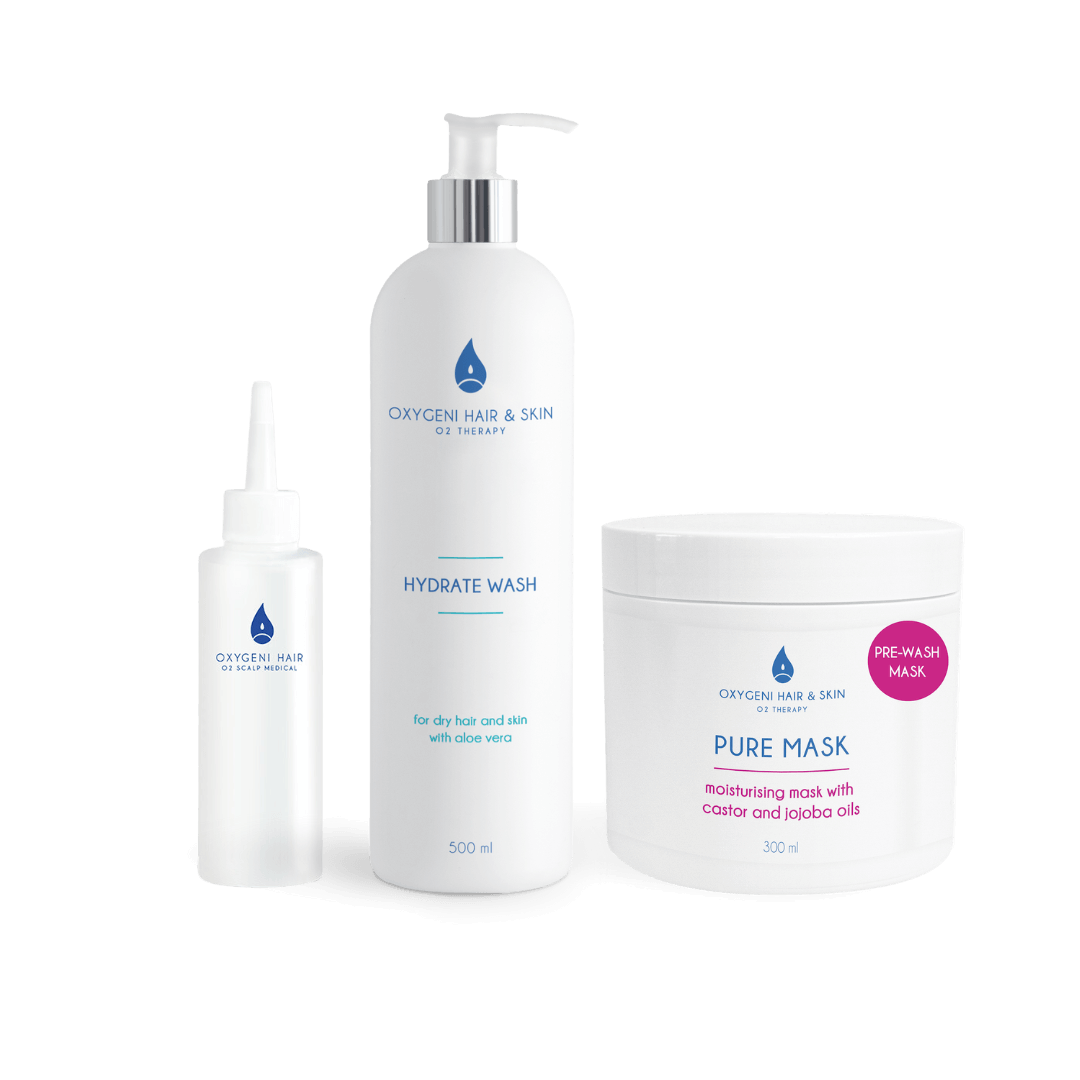
Product bundle for Dry Hair with damaged ends
We recommend the combined use of our Hydrate Wash (500 ml) and Pure Mask (300 ml) for damaged and dry hair. Hydrate Wash is a multifunctional product suitable for dry skin and scalp, it not only has antibacterial and anti-inflammatory effects but also softens and strengthens the skin. Pure Mask deeply nourishes the scalp and improves the structure of the hair strands with the help of castor, rosemary, and jojoba oil. The active ingredients contribute to hair growth, soothe the scalp, reduce irritation, and help prevent bacterial infections.
WHAT TO AVOID IF YOU STRUGGLE WITH DRY SCALP AND BRITTLE HAIR?
- Avoid hair care products enriched with chemicals, including shampoos and treatments containing SLS-SLES and silicones.
- Avoid using high alcohol content styling products (hairspray, hair lacquer).
- Avoid drying products: root-lifting powders, dry shampoos.
- Avoid frequent use of hair styling tools: hair straighteners, curling irons, high-heat hair dryers.
- Do not scratch your scalp! If it itches, use soothing scalp treatments, with aloe vera being the most effective.
- Do not wash your hair too often. Limit hair washing to a maximum of three times a week using lukewarm water and chemical-free, natural shampoo.
- Do not expose your scalp and hair to strong sunlight. Wear a hat or scarf when going out in the sun.
- Avoid intensive chemical treatments: hair dyeing, bleaching, perming, and permanent straightening.
- Do not dye your hair at home. Find a reliable hair salon that uses gentle products and maintains good hygiene.
- Avoid air-conditioned environments; if you're in a car, roll down the window instead.
- Avoid overly salty and sugary foods! Eat more vegetables, fruits, and raw foods.
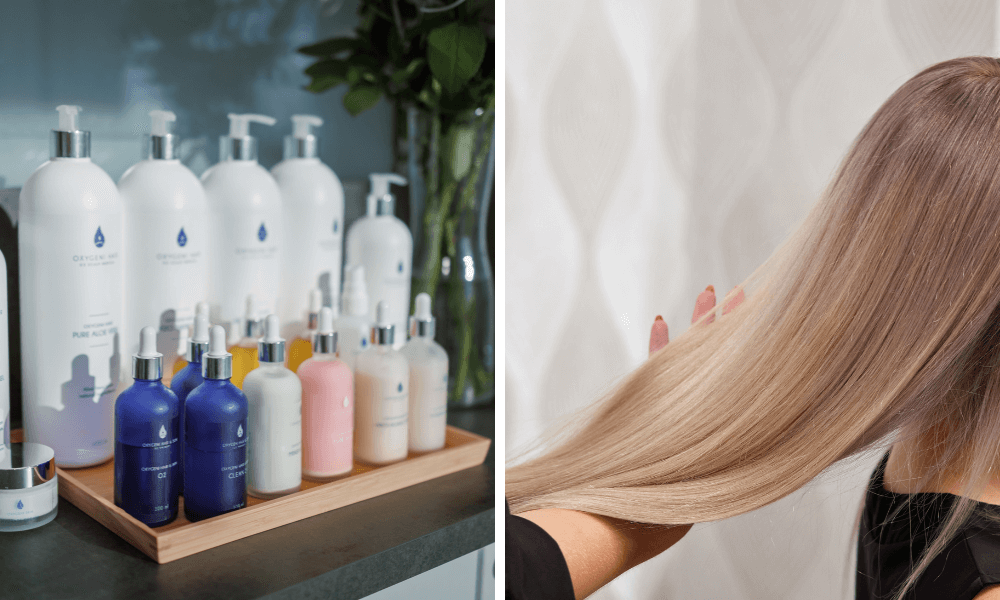
If you encounter difficulties while treating dry hair or need more comprehensive, personalized advice, consult your trichologist. They will examine the condition of your scalp and hair through micro-camera and manual hair diagnosis and develop an individual treatment plan for you.
OXYGEN THERAPY AND OXYGENI HAIR PRODUCT REVIEWS
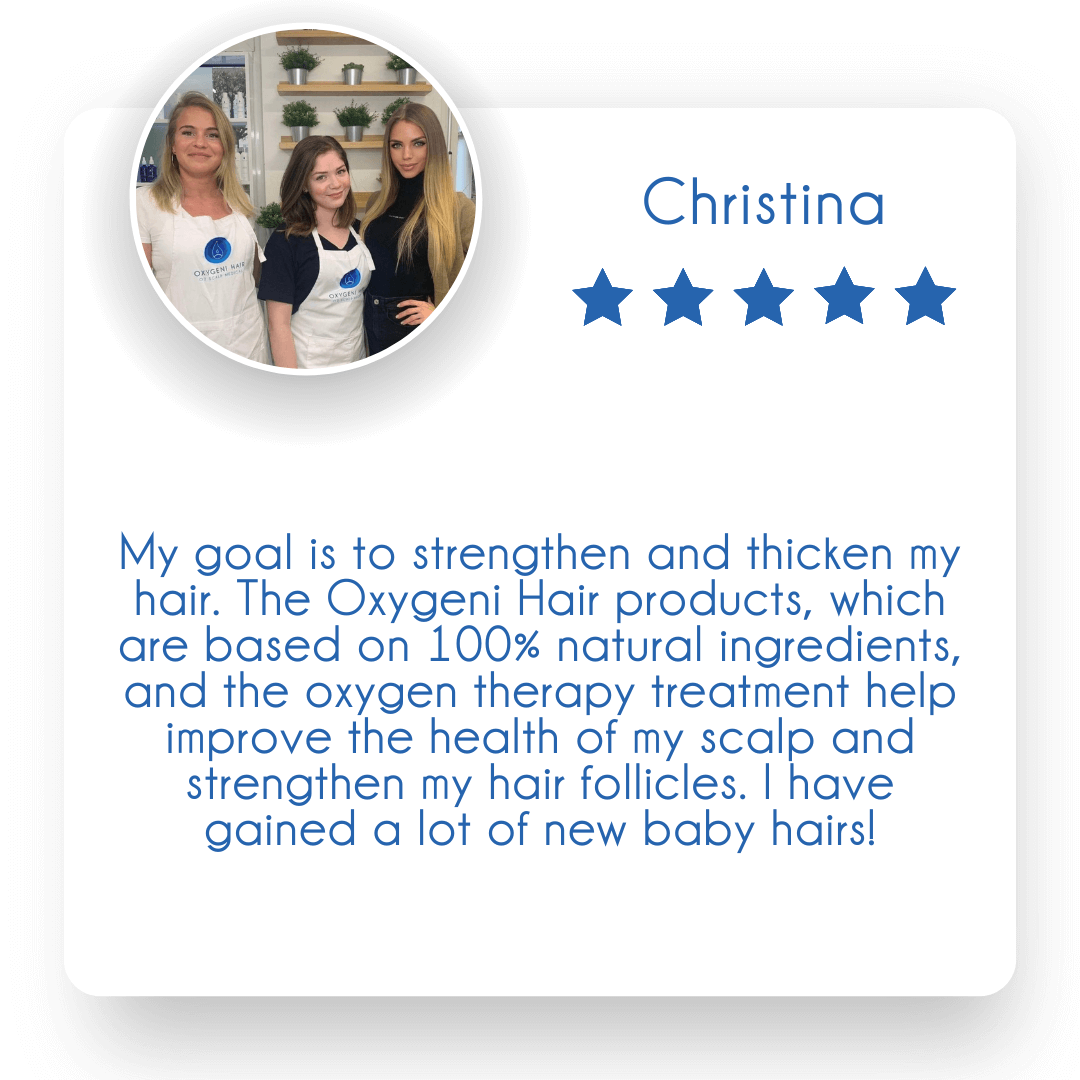

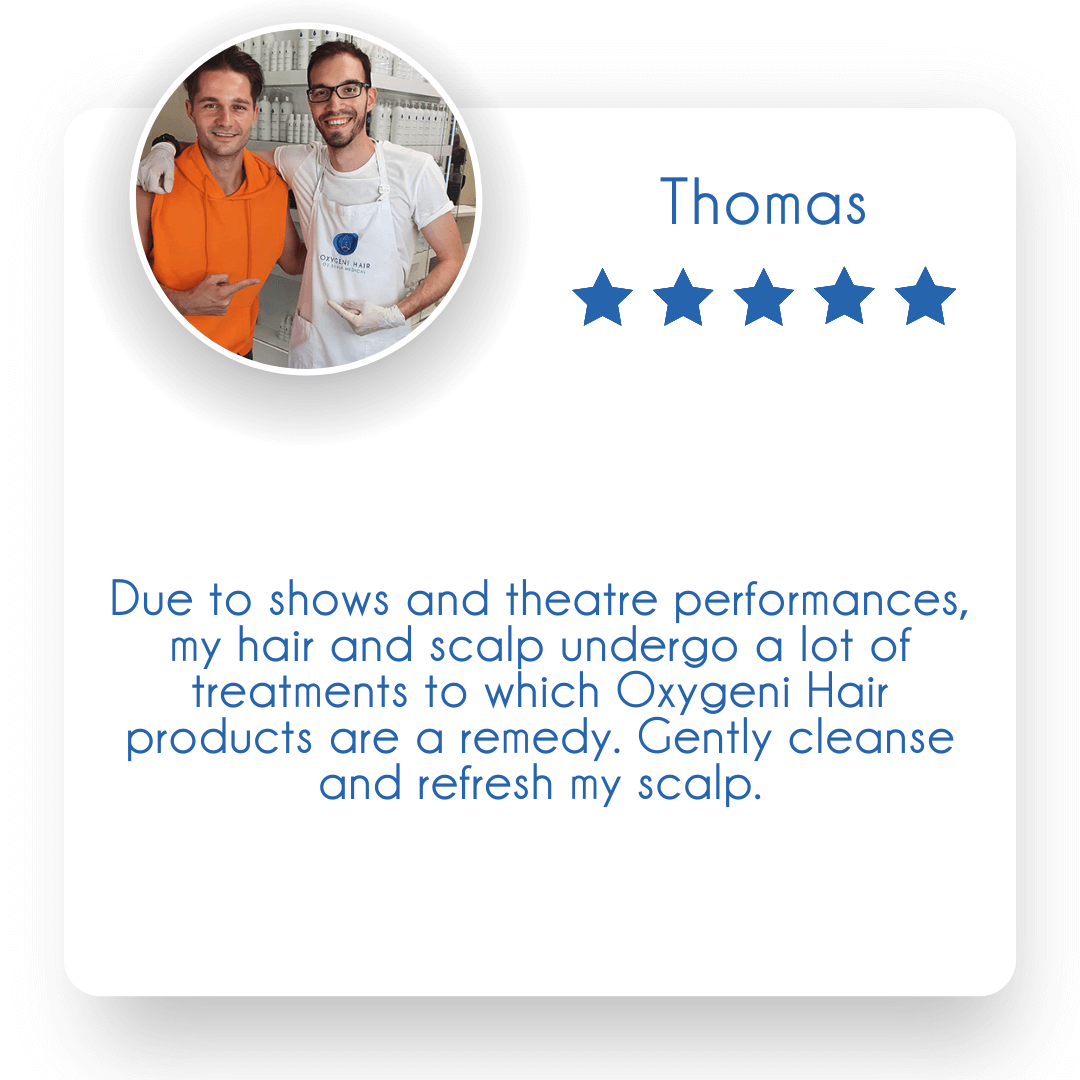
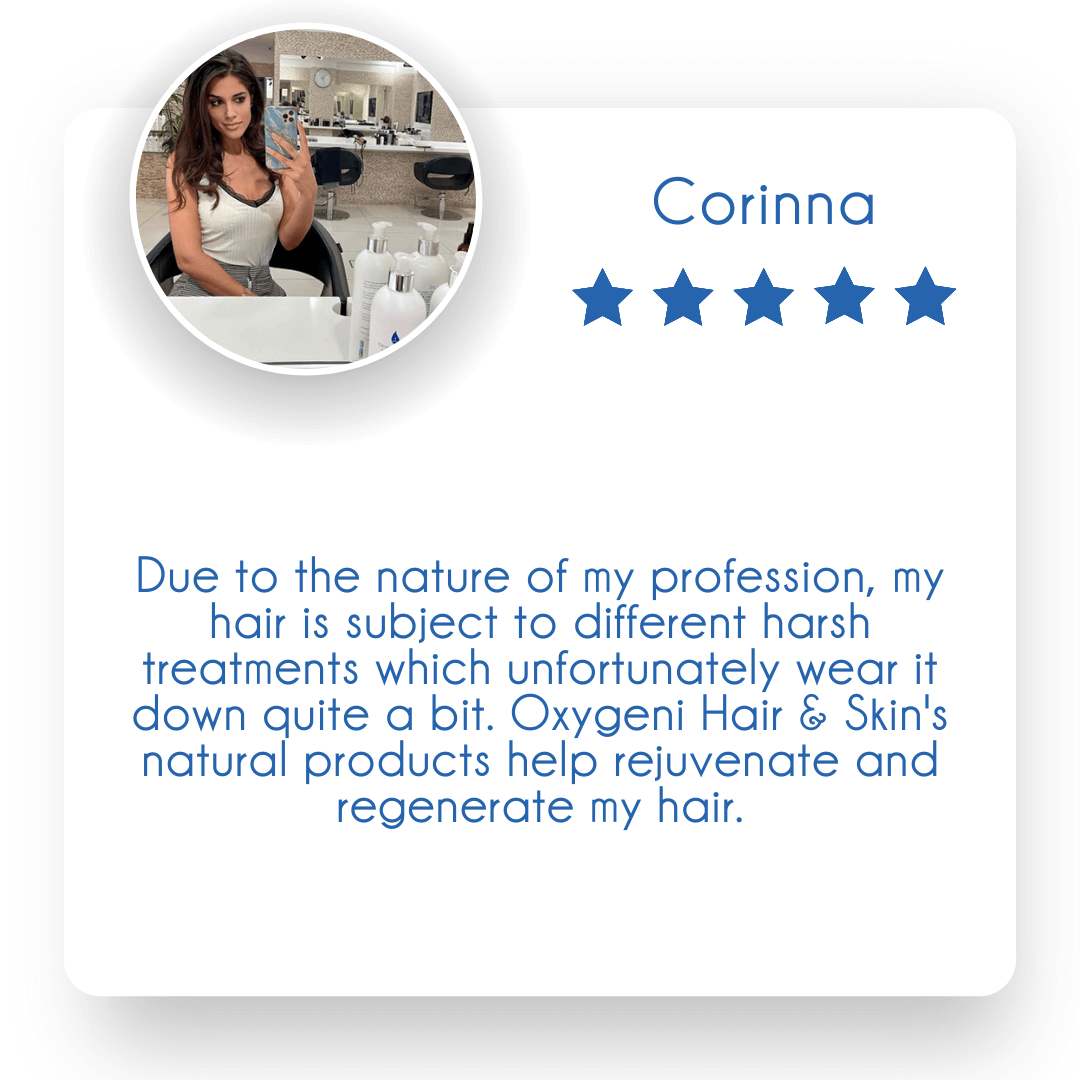
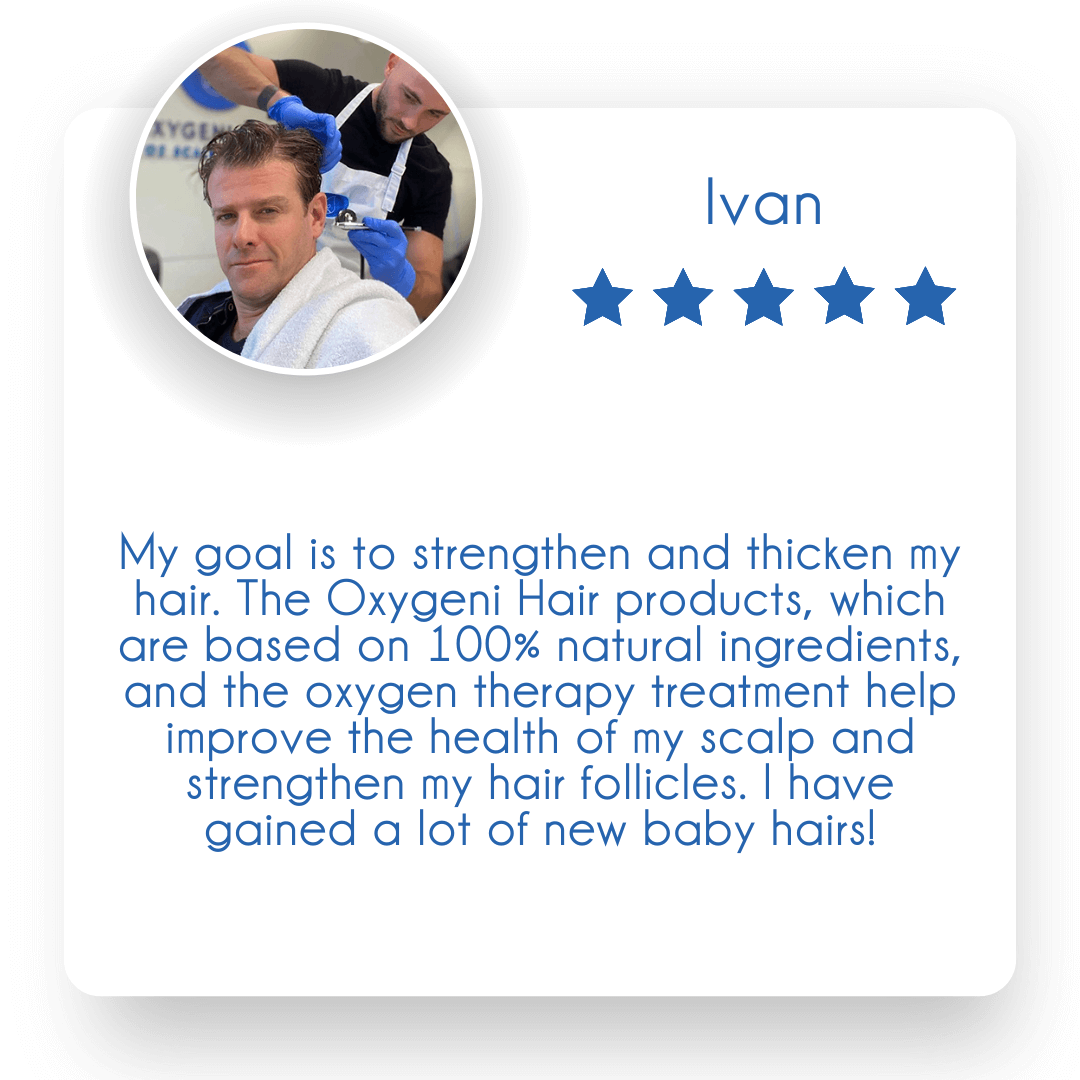
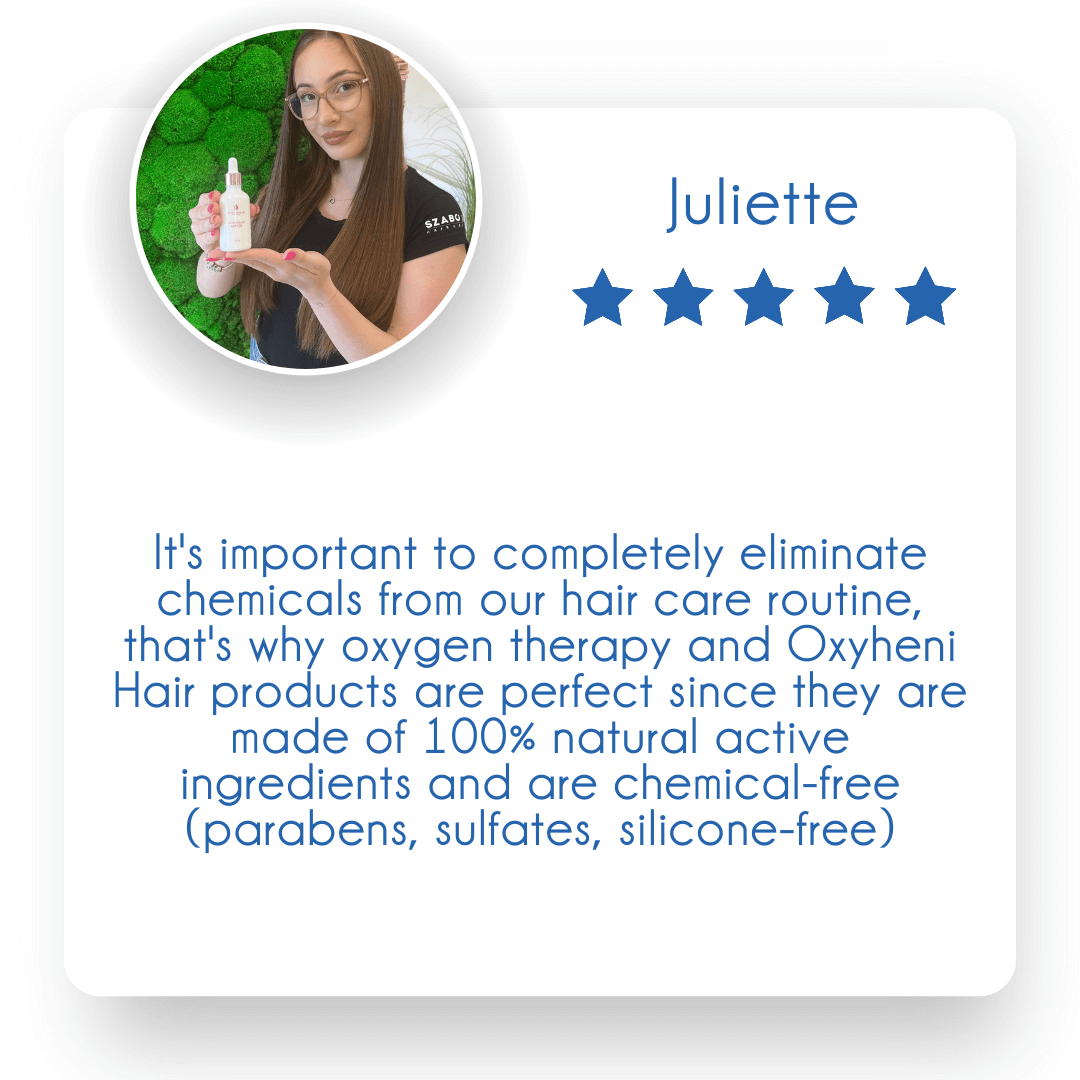
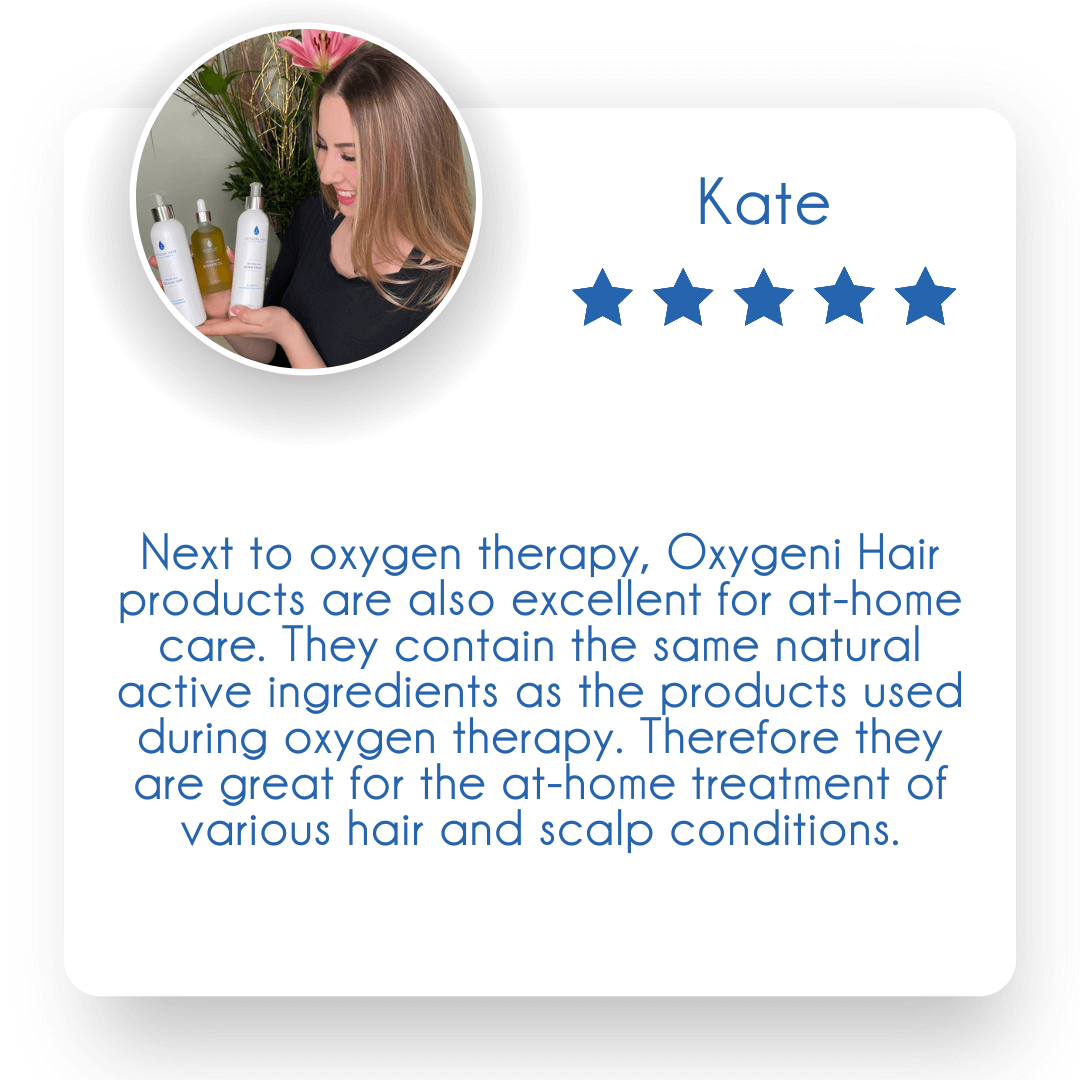
Follow us on our social media platforms!
